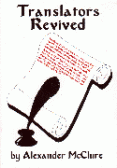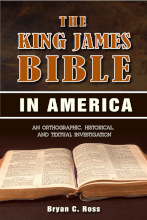WHY USE THE KING JAMES VERSION?
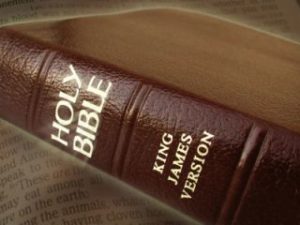 Currently, there is much confusion in Christendom over the location of God’s Word. A simple stroll through the Bible section at the local Christian bookstore could not help but leave the honest Christian confused. If God only authored and inspired one Bible, how can there be so many translations all claiming to be God’s Word? The New International Version (NIV), the New American Standard (NASV), the King James (KJV), the New King James (NKJV), and many others all claim to be accurate and faithful translations of the “original” manuscripts. The average Christian thinks modern translations such as the NIV, NASV, NKJV or the New Living Translation are simply an updating of the “archaic” language of the King James Version, therefore, all versions are essentially the same.
Currently, there is much confusion in Christendom over the location of God’s Word. A simple stroll through the Bible section at the local Christian bookstore could not help but leave the honest Christian confused. If God only authored and inspired one Bible, how can there be so many translations all claiming to be God’s Word? The New International Version (NIV), the New American Standard (NASV), the King James (KJV), the New King James (NKJV), and many others all claim to be accurate and faithful translations of the “original” manuscripts. The average Christian thinks modern translations such as the NIV, NASV, NKJV or the New Living Translation are simply an updating of the “archaic” language of the King James Version, therefore, all versions are essentially the same.
Unfortunately, upon further investigation a serious and glaring problem becomes apparent. The modern translations are not simply updates of the King James language, but totally different Bibles altogether. For example, let us compare Mark 1:2-3 in both the King James Version and the New International Version. First, let us consider the King James. It reads:
2) As it is written in the prophets, Behold, I send my messenger before thy face, which shall prepare thy way before thee. 3) The voice of one crying in the wilderness, Prepare ye the way of the Lord, make his paths straight.
Upon careful study, the reader will notice the use of the word “prophets” in verse 2. This is a critical point because Luke is quoting in these verses from more than one prophet. In verse 2 the quotation “Behold I send my messenger before thy face, which shall prepare the way before thee”, is found in Malachi 3:1. Verse 3, on the other hand, is a quotation from Isaiah 40:3. Thus the King James Version is accurate in its use of “prophets” in verse 2 because Mark is referencing more than one prophetic book.
In contrast, the NIV offers a reading that is not only inaccurate but also wrong. In the NIV Mark 1:2-3 reads as follows,
2) It is written in Isaiah the prophet: “I will send my messenger ahead of you, who will prepare your way” 3) “a voice of one calling in the desert, ‘Prepare the way for the Lord, make straight paths for him.'”
According to the NIV reading, both quotations come from the book of Isaiah. Notice that the New International’s use of “Isaiah the prophet”, is singular when according to their own footnotes, Mark is quoting from both Malachi 3:1 and Isaiah 40:3. The resulting reading is not even correct. The King James’s use of “prophets” is plural thus correctly identifying Mark as quoting from more than one prophet.
The reason the NIV and KJV differ in their rendering of Mark 1:2 has nothing to do with the translation of individual Greek words. In other words, the Greek manuscripts used by the King James translators contain the Greek word “prophets” which is correctly translated prophets. In contrast, the Greek manuscripts used by the New International translators contain the Greek word for Isaiah thus accounting for the verse’s incorrect reading.
The real issue at stake in the version debate is not how to translate individual words from Greek into English, rather, it is which set of manuscripts are used to make the translation. In the brief example cited above the reason, the KJV and NIV say different things is because their underlying Greek texts are different. Common sense says that you cannot translate a verse that is not in the Greek manuscript you are trying to translate. For example, the reason the NIV leaves verses out of the Bible like, Matthew 23:14, is because the entire verse is missing from the Greek texts being translated. The reason the King James includes Matthew 23:14 is because the Greek texts used by its translators contained the verse. One is left to conclude that the real issue in the version debate is which set of Greek manuscripts are going to be used when translating.
It is the view of the saints at Grace Life Bible Church that the King James Version and its underlying Greek text the Textus Receptus is the correct and uncorrupted location of the Word of God. We hold firmly to the doctrines of the Verbal Plenary Inspiration of the Scriptures (II Timothy 3:16-17), and the preservation of every word of the Inspired Scripture (Psalm 12:6-7). As a result, we are pleased to offer the following online resources to help you understand the issues surrounding our conclusion, that the King James Bible is the accurate and preserved Word of God for English-speaking people.
Resources By Pastor Bryan Ross

- From This Generation For Ever: A Study of God’s Promise to Preserve His Word
- From This Generation For Ever: Complete Notes
- The Language and Readability of the King James Bible (2011)
- The Apocrypha and the King James Bible (2012)
- The Paulicians and the Preserved Text Notes (2015)
- Collation Comparing Variant English Readings In The Geneva, Bishops, and King James Bibles (2015)
- The Textual History of the English Bible (2015)
- Is Mark 1 Verses 2-3 Correct in the King James Bible (2015)
- Do Psalms 12:6-7 Teach the Preservation of God’s Words (2017)
- Pilfering the Power of the Paper Pope of Protestantism (2017)
- The Two Streams of Bibles Model of Transmission Complete Notes (2019)
- The Word For All Ages: An Argument for the Inerrancy of the King James Bible (2019 GSB Conference Message)
- The King James Bible in America: Response to Rodney’s Critique
- The Word For All Ages: An Argument for the Inerrancy of the King James Bible (2021 Video Series)
- Producing A Proper Perspective On The Preface Complete Document (Updated) (2023)
- The Making of the King James Bible (2023)
- The AV 1611: Examining The Marginal Notes (2023)
- “Of The Weight” In Numbers 7:31: Printer’s Error Or Editorial Change?
Charts
- Two Bible Lines (2011)
- Protestant Bibliology Before and After 1860 (2016)
- Why Preservation Matters Flow Chart of Ehrman’s Error (2016)
- Scriptural Model for Dealing with Textual Variants (2017)
- Historical Development of the Protestant Bibliology Historical Development of the Protestant Bibliology (2017)
Work by Pastor Ross Available for Purchase (Click the Link to Order)
The King James Bible in America: An Orthographic, Historical, and Textual Investigation
Don’t Passover Easter: A New Defense of “Easter” in Acts 12:4
Additional Resources
Note: Pastor Ross may not agree with every individual point made in the following resources but does concur with their overall conclusions.
- King James Home Page
- KJV Dictionary
- Wescott and Hort’s Magic Marker Binge! (Part 1 Matthew-John)
- Westcott and Hort’s Magic Marker Binge! (Part 2 Acts-Revelation)
- The KJV 400. COM
- The authorized edition of the English Bible (1611): its subsequent reprints and modern representatives (1844) – F.H.A. Scrivener
- The Existing Monopoly, An Inadequate Protection Of The Authorised Version Of The Scripture – Thomas Curtis
- Report On the History And Recent Collation Of The English Version Of The Bible – American Bible Society 1851
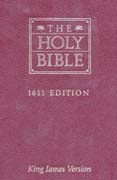
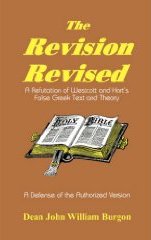
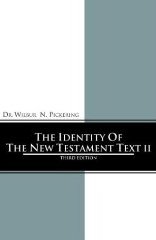
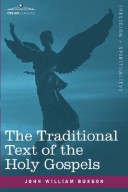
- The Traditional Text of the Holy Gospels by John William Burgon
- “A Brief History of the King James Bible” by Dr. Laurence M. Vance
